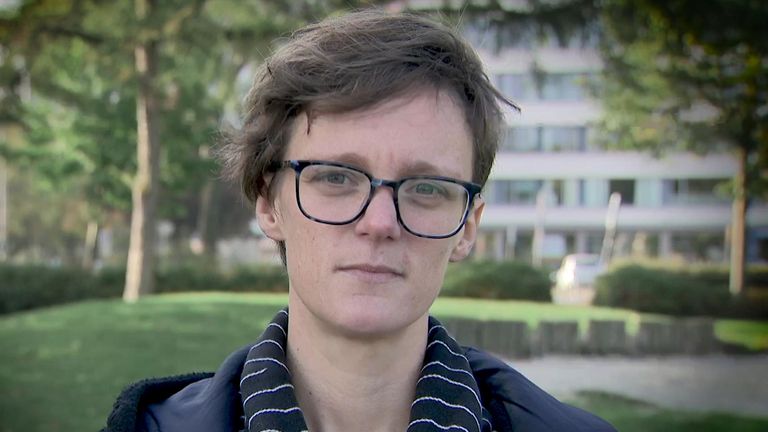
Amy de Schutter has been granted the right to die in Belgium after doctors agreed her mental suffering is unbearable.
Tuesday 25 August 2020 08:58, UK
Please use Chrome browser for a more accessible video player

12:36
It's a debate that's gone on for decades. But Britons could soon be given the right to die under certain circumstances.
Amy de Schutter is in her 30s and physically well, but she has been granted the right to die whenever she wants.
The decision came after three doctors in her home country of Belgium - where euthanasia is legal - agreed her mental suffering from depression and autism is unbearable.
As a leading MP predicts the UK will legalise assisted dying within the next four years, Ms de Schutter tells Sky's Becky Johnson why she fought for the legal right to die - and why it may have saved her life.
I met Amy de Schutter at her home in Belgium. She's young, welcoming and engaging.
As we chatted on the balcony of her apartment in Antwerp, the sun streamed down across the city skyline. It seemed almost incongruous to be talking about death.
But we'd travelled to meet Amy because she had agreed to speak to us about why she fought for the legal right to die whenever she wants.
Amy has no physical illness. She has a degree in physics and she's written a book.
She has also had depression since she was a child and has recently been diagnosed with autism.
"I don't want to die, but I don't want to live like this," she says. "It's unbearable at this moment and it's been unbearable for a long period of time.
Advertisement"There's always chaos in my head and I cannot find peace of mind - never, never, never. It never stops.
"I can understand people saying; 'You look okay and you have a degree in physics and you have a nice apartment,' but if you would see me day in day out in my apartment, crying a lot of the time, even not able to take a shower just because I'm overwhelmed by everything.
"I can't have a job. I don't have a lot of money because if you can't work then…
"You get more socially isolated. Having a partner is also not possible for me. Children. it's impossible for me."

She says she began experiencing depression when she was 11 or 12 years old. During her teenage years, she spent long periods of time in psychiatric institutions.
"I have extreme traumas from my childhood," she says.
She tells me she attempted to take her own life on many occasions.
"A lot of them were very serious attempts where I had to be hospitalised in intensive care units," she said. "My mum always said, like, I buried you already so many times."
She was in her late 20s when she decided to request an assisted death.
In Belgium, euthanasia has been legal since 2002. The country now has some of the most liberal assisted dying laws in the world.
It's an option for anyone with unbearable suffering, whether physical or mental.
Her request was granted after three doctors agreed that she met the criteria. It means she now has the right to die whenever she wants.
"I was so, so happy," she says.
"In my case it was also very important that I would be able to decide. And that people said; 'Okay, we understand your pain and especially we understand the fact that it's very important for you that you can decide whether you want to try and keep living.'
"I need to be able to say - okay, when I feel like it's getting really, well, really bad, that I can think about it…I can talk about the date, I can talk about the funeral."

I ask if she has thought about her funeral.
"Everything is already planned, even with my parents," she replied. "For me, I've been doing this since I was 12 years old and I don't think it's ever going to change."
She is now in her mid-30s and has not yet set a date for her death.
Since being granted the right to die she has not attempted to take her own life.
"I understand that it's a paradox," she says. "Actually, it's saved my life because from then on, I knew that I would be able to decide whether or not I want to continue with my life."
She says she feels grateful to live in a country like Belgium where she has the right to choose.
I ask if she can understand why some people may feel uncomfortable that a young, physically healthy woman has been granted the right to end her life.
"Try to understand it even if it's against your own belief systems," she says. "Talk to the people who don't want to live anymore.
"Don't judge people who are asking [for] it and if, like in the UK, it's not even possible to ask [for] it, you can ask yourself the question - are we actually helping people here or just letting people suffer?"
Anyone feeling emotionally distressed or suicidal can call Samaritans for help on 116 123 or email jo@samaritans.org in the UK.